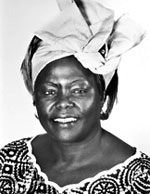Wangari Maathai Biography
 Wangari Maathai (1940 – 2011) was a Kenyan environmental activist. She founded the Green Belt Movement in the 1970s seeking to promote environmental conservation in Kenya and Africa. She became the first African woman to receive the Nobel Peace Prize in 2004 for “her contribution to sustainable development, democracy and peace.”
Wangari Maathai (1940 – 2011) was a Kenyan environmental activist. She founded the Green Belt Movement in the 1970s seeking to promote environmental conservation in Kenya and Africa. She became the first African woman to receive the Nobel Peace Prize in 2004 for “her contribution to sustainable development, democracy and peace.”
After campaigning for the restoration of democracy in Kenya during the 1990s, she served as a member of Parliament and Assistant Minister for the environment and natural resources between 2003 and 2005.
Early Life Wangari Maathai
Maathai was born 1 April 1940 in the Nyeri District in the central highlands of Kenya. She is a member of the Kikuyu – the most populous tribe in Kenya. When she was young, her family moved to the Rift Valley, where her father worked on a white-owned farm. Her early experiences of living close to the land remained a strong motivation for promoting conservation of the natural landscape.
At the age of 11, she was sent to a Catholic boarding school where she became a Catholic. During her childhood, the Mau Mau uprising sought to achieve Kenyan independence from the British; however, at the boarding school, she was protected from the violence.
In 1960, she gained a scholarship to study in the US. She gained a master’s degree in biology from the University of Pittsburgh. She later studied for a doctorate at the University of Munich. In 1969, she returned to Nairobi where she became the first East African woman to receive a PhD – which she gained it in veterinary anatomy.
Maathai’s academic career was successful, and she became the first woman to be appointed to various positions of seniority at Nairobi university. Using her position of influence, she sought to campaign for equal benefits for the female staff. Many of these campaigns were successful.
In the mid 1970s, Maathai became concerned about the impact of environmental degradation on the economic and social fortunes of Kenya. Deforestation was causing landslips and more frequent draughts. Poor harvests and lack of rainwater, exacerbated inter tribal conflict as people were forced to fight for meagre resources. She felt protecting the environment would prevent many of these economic and social problems.
In 1974, her husband became an MP, and Maathai sought to support his promises to find work for the rising number of unemployed. It was at this time, Maathai made her first attempt to create a foundation for planting trees. A lack of money limited its initial success, but her efforts were rewarded with gaining a trip to the 1976 UN conference on human settlements. Here Maathai advocated more tree planting to improve environmental conditions.
After the conference Maathai led a movement to plant trees throughout Kenya. This became known as the Green Belt movement and has become a prominent environmental organisation supporting conservation and tree planting across Africa. The Green Belt movement was supported by the Norwegian Forestry Society and Maathai later gained a job as coordinator.
In the early 1980s, Maathai was elected chairman of the National Council of Women of Kenya (NCWK). She held this position until she retired in 1987. The NCWK was a collection of women groups. Under Maathai, it became increasingly focused on environmental issues. Maathai later talked about her motivation for caring about environment and humanitarian issues.



No comments:
Post a Comment